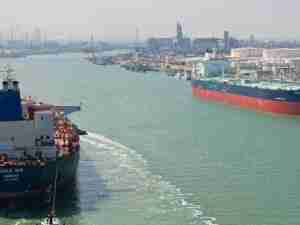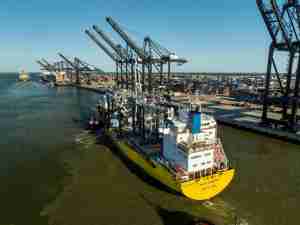The U.S. Department of Transportation (USDOT) awarded 166 projects over $2.2 billion from the Rebuilding American Infrastructure with Sustainability and Equity (RAISE) program. Included among the recipients are 11 projects sponsored or supported by members of the Coalition for America’s Gateways and Trade Corridors (CAGTC). According to USDOT, this round saw $13.3 billion in requested funds from a total of 935 eligible applications from all 50 states, the District of Columbia, Northern Mariana Islands, Puerto Rico, and the Virgin Islands. The Bipartisan Infrastructure Law (also known as the Infrastructure Investment and Jobs Act) provided $2.2 billion for the Fiscal Year 2022 round of funding, meaning that requests outnumbered available funds by a ratio of 18:1.
“Year after year, the RAISE program has proven to be an important tool for advancing a wide array of mobility projects,” said CAGTC Executive Director Elaine Nessle. “This is particularly true for freight projects, which are frequently multimodal, multijurisdictional, and large in scope. While many of these important freight projects are difficult to fund by traditional sources, such as formula distributions, merit-based competitive grant programs provide much-needed flexibility. For years, CAGTC members have called for increased freight infrastructure investment to meet growing demands. This round of RAISE awards comes at a critical time and will enable strategic investments.”
Port Tampa Bay’s New Berth 301 will receive $12,600,000 to construct a new Berth 301 at the Port Redwing facility, which will connect Berths 300 and 302 with a 1,025-foot dock. The facility will have a 3,000- linear-foot berth capable of simultaneously docking three of the largest dry bulk/multi-purpose cargo vessels that can navigate the newly expanded Big Bend Channel.
“We’re already seeing the dividends of the historic Infrastructure Investment and Jobs Act passed last year. The Berth 301 project will have a generational impact on our community in terms of economic development and well-paying jobs. Port Redwing has seen tremendous growth since the deepening and expansion of the Big Bend Channel. As our community continues to see record population growth, it is important to provide an efficient way to move construction and other bulk cargoes. This project optimizes supply chain economics and helps keep wear and tear on roads to a minimum,” explains Paul Anderson, CAGTC Chairman and Port Tampa Bay CEO & President.
Freight Mobility Strategic Investment Board (FMSIB)/ City of Spokane Valley’s Pines Road/ BNSF Grade Separation Project will receive $21,689,221 to replace the highway-rail at-grade crossing of Pines Road (State Route 27) and the BNSF Railway tracks with a new Pines Road underpass. The project will replace the signalized intersection of two state highways, Pines Road (SR 27) and Trent Avenue (SR 290), with a multi-lane roundabout, and construct a separated shared use path under the railroad crossing and an adjacent shared use path around the new roundabout intersection. The project will also construct a new trailhead and parking lot facility, equipped with restrooms, electric vehicle charging, and non-motorized access to the adjacent Centennial Trail and Spokane River.
“Washington State’s Freight Mobility Board (FMSIB) is a key financing partner assisting local governments in removing freight bottlenecks, whether as ‘first dollars’ in to improve grant competitiveness or as ‘last dollars’ in to get a project over the finish line,” stated Dan Gatchet, FMSIB Chair. “FMSIB is very proud to be a supporter of the Pines Road/BNSF Separation Project since 2004 and congratulates Spokane Valley for their success in this RAISE grant award.”
Southern California Association of Governments (SCAG) supported several successful projects in this round of RAISE grants, including those submitted by the City of Fontana, City of Inglewood and Port of Los Angeles:
City of Fontana’s Building a Better-Connected Inland Empire will receive $15,000,000 to make major complete streets improvements by constructing additional lane capacity, an integrated traffic system, medians with protected left turns, a roundabout, bus turnouts, streetlights, signage, and raised medians, more than 7.5 miles of bike lanes, including more than 2.5 miles of separated bike lanes, a half-mile of multi-use trail, crosswalks, a bridge, and countdown signal heads.
City of Inglewood’s Inglewood Transit Connector Project will receive $15,000,000 to complete an approximately 1.6-mile fully elevated, automated transit system with three stations to compete a critical gap in the region’s transit system, on segments along Market Street, Manchester Boulevard, and Prairie Avenue. It includes construction of three center platform stations.
“This funding will be instrumental in helping address the backlog of infrastructure needs in Southern California, one of the most critically important population and economic centers in the country,” said Kome Ajise, Executive Director of the Southern California Association of Governments. “As America’s global freight gateway and a pivotal part of the nation’s supply chain, this investment is essential to the economic vitality of both our region and the United States.”
Port of Los Angeles’ Maritime Support Facility Access/ Terminal Island Rail System will receive $20,000,000 to construct a four-lane, rail-roadway grade separation. This project will eliminate a significant truck access impediment to an important container terminal support facility located on Terminal Island, while significantly reducing delays, accidents, and emissions at the Ports of Los Angeles and Long Beach, which handle 35 percent of all waterborne containers entering the United States.
“This $20 million grant accelerates our ability to build a critical rail-roadway grade separation on Terminal Island that will reduce cargo delays, improve safety for local motorists and provides increased resiliency and competitiveness to the nation’s busiest port complex,” said Port of Los Angeles Executive Director Gene Seroka.








